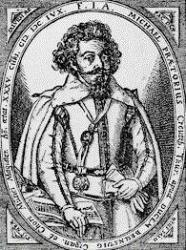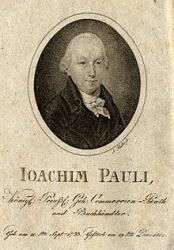Planning worship?
Check out our sister site, ZeteoSearch.org,
for 20+ additional resources related to your search.
- |
User Links
Person Results
‹ Return to hymnal


Export as CSV
Konrad Gebhard Stübner
1698 - 1759 Person Name: C. G. Stuebner Hymnal Number: d123 Author of "In Gottes Reich geht Niemand ein" in Reformirtes Gesangbuch erste Auflage
Konrad Gebhard Stübner
Benjamin Praetorius

1636 - 1674 Hymnal Number: d222 Author of "Sei getreu bis an das Ende, damit keine Qual und Not" in Reformirtes Gesangbuch erste Auflage Prätorius, Benjamin, son of Andreas Prätorius, pastor at Obergreieslau near Weissenfels in Saxony, was born at Obergreisslau, January 1, 1636. In 1637. his father was appointed pastor at Gross-Lissa near Delitzsch, in Saxony. Benjamin became a student of theology, and giaduated M.A., probably at Leipzig. In the entry of his marriage in the registers of Gross-Lista, for 1657, he is described as "regularly ordained substitute and future successor of this parish": and he is never described in the registers except as Pastor-substitute. His ninth child was born in 1671, and on Jan. 8, 1675, his son Andreas Benjamin, on acting as godfather, is described as “surviving son" of M. Benjamin Prätorius. It is probable that he died some time in 1674, but as the register of deaths of this period is lost, we are unable to fix the exact date (K. Goedeke's Grundriss, vol. iii., 1887, p. 176; manuscript from Pastor Moebius of Gross-Lissa, &c).
According to Wetzel, ii., 314, he was crowned as a poet on Feb. 15, 1661. In the registers for 1663 he first designs himself "poëta Caes." and "Kais. gekrönter Poëta" (i.e. imperial crowned poet), and in 1670 as "poëta Caes. laur. coronatus." His hymns appeared in his (1) Jauchtzendes Libanon, Leipzig, 1659, and (2) Spielende Myrten-Aue, Leipzig, 1663. In the preface to the latter he signs himself as "C. P. Caes. und Diener am Wort daselbst" (minister of the Word), under date “Gross-Lissa, Dec. 24, 1663."
The only hymn by him translated into English is:—
Sei getreu bis an das Ende. The Reward of the Faithful. In 1659, as above, No. 64, p. 15?, in 9 stanzas of 8 lines, and founded on Rev. ii. 10. In full in the Unverfälschter Liedersegen, 1851, No. 339. It is also often found as "Sei getreu in deinem Leiden," as in the Berlin Geistliche Lieder, ed. 1863, No. 749. This is from Luppius' sGesang-Buch, Wesel, 1692, p. 22, where it is in 7 stanzas (iv., ii., iii., v., ix., i. and a new stanza which begins, "So wohlan, so will ich leiden"), and is erroneously ascribed to J. C. Schade. The original form is tr. as:—
Be thou faithful to the end, Let not. By Miss Warner, in her Hymns of the Church Militant, 1858, p. 362, repeated as No. 255, in Bishop Ryle's Collection, 1860. [Rev. James Mearns, M.A.]
--John Julian, Dictionary of Hymnology (1907)
Benjamin Praetorius
Christoph Pfeiffer
Hymnal Number: d82 Author of "Guter S'mann, deine G'nge" in Reformirtes Gesangbuch erste Auflage
Christoph Pfeiffer
Johann Adolf Schlegel
1721 - 1793 Person Name: Johann Adolph Schlegel Hymnal Number: d40 Author of "Der am Kreuz ist meine Liebe, meine Lieb' ist Jesus Christ" in Reformirtes Gesangbuch erste Auflage Schlegel, Johann Adolf, D.D., son of Dr. Johann Friedrich Schlegel, Appellationsrath at Meissen, in Saxony, was born at Meissen, Sept. 17, 1721. After passing through the famous school at Pforta (Schulpforta), near Naumburg, he studied, from 1741 to 1746, at the University of Leipzig, where he became acquainted with Cramer, Gellert, and Klopstgock, and was one of the principal contributors to the Bremer Beiträge (Neue Beyträge zum Vergnügen des Verstandes und Witzes). In 1746 he became a private tutor at Strehla, in Saxony, and then returned to Leipzig, where he occupied himself in literary work, until he went, in 1748, to live with his friend Cramer at Crellwitz, near Lützen. He remained at Crellwitz till 1751, when he was appointed a master in his old school at Pforta, and also diaconus of the church there. In 1754 he became chief pastor of the Holy Trinity church at Zerbst, and also professor of Theology and Metaphysics in the Academic Gymnasium in that town. He removed to Hannover in 1759, as pastor of the Markt Kirche. In 1775 he was removed to the Neustadt Church there, as chief pastor, and also as Consistorialrath and Superintendent. "While retaining his pastorate at Hannover, he was also appointed, in 1782, as General Superintendent of the district of Hoya. In 1787 he exchanged this for the General Superintendentship of the Principality of Kalenberg. The same year he received the degree of D.D. at the Jubilee Festival of the University of Göttingen. He died of fever, at Hannover, Sept. 16, 1793…
Schlegel was a most prolific writer, though to the literary world at large the names of his song, August Wilhelm and Friedrich von Schlegel, are better known. He was one of the most celebrated preachers of his time, and the author of many volumes of sermons. His hymns suited the taste of the Rationalistic period, and were exceedingly popular in the end of the 18th century, but have now, in great measure, passed out of use. Many of them were merely polished and weakened versions of, or were founded upon, earlier hymns. In his strictly original hymns, he does not at all equal either Gellert or Klopstock.
His hymns appeared in the following collections:—
(1) Sammlung geistlicher Gesänge zur Beförderung Jer Erbauung, Leipzig, 1766; 2nd ed., revised and enlarged, Leipzig, 1772. (2) Zweite Sammlung. Leipzig, 1769. (3) Dritte Sammlung, Leipzig, 1772. (4) Yermischte Gedichte, 2 vols., Hannover, 1787 and 1789 [1, 2, 4, in British Museum; 3 and 2nd ed. of 1 in Hamburg Library.] He edited, and contributed to, the 1792 Appendix to the Hannover Gesang-Buch, 1740.
One of Schlegel's hymns is a translation of, and is noted under "Veni Creator Spiritus." The others which have passed into English are :—
i. Wie herrlich strahlt der Morgenstern. Love to Christ. First published in 1763, as above, p. 112, in 7 st. of 11 1., and entitled, "Longing after union with Jesus, on the model of the old hymn, Wie schon leuchtet der Morgenstern." The trs. in common use are :—
1. How brightly beams the Morning Star! This is a good translation, omitting st. iv., vii., by Miss Winkworth, in her Chorale Book for England, 1863, No. 36.
2. How brightly shines the Morning Star! What eye descries it from afar. A good tr., omitting st. vii., contributed by J. M. Sloan to J. H. Wilson's Service of Praise, 1865, No. 282, and repeated, omitting st. iii., iv., in Wilson's Songs of Zion, 1878.
Hymns not in English common use:—
ii. Es lag die ganze Welt. St. John Baptist's Day. The tr. from Schlegel's recast is "The world enslav'd to sin."
iii. Jauchzt! es ist eine Ruh vorhanden, Sleeping in Jesus. First published in his Vezmischte Gedich, vol. i., 178 , p. 128, in 2 stanzas of 10 lines, dated 1777, and entitled, "Of the happiness of Heaven." Translated as "Rejoice, that rest is not far distant." By Miss Manington, 1863, p. 89.
iv. Mein Jesu, fur dein Herz. Passiontide. First published in 1766, as above, p. 65, in 14 st. of 6 1. Tr. "How trying to the heart." By Dr. H. Mills, 1845, p. 210.
v. Schweigt Stürme! brauset nicht ihr Meere. Summer. This is an Ode, first published in the Neue Beyträge, &c, Bremen and Leipzig, vol. i., 1744, and entitled, " Praise of the Godhead. On the model of the 104th Psalm." It is translated as, "Around me all is joy-—and oh, my God." By Miss Fry, 1859, p. 111.
vi. Tag, der Erleuchtung uns gebracht. Whitsuntide. First published in 1769, as above, p. 42, in 9 st. In some collections, as in the Kopenhagen Gesang-Buch, 1782, No. 282, it begins "O Tag, der uns des Vaters Rath." This is translated as "O day! that hast unto our souls set forth." By Miss Fry, 1859, p. 94. [Rev. James Mearns, M.A.]
--Excerpts from John Julian, Dictionary of Hymnology (1907)
Johann Adolf Schlegel
Ida von Hahn-Hahn
1803 - 1878 Hymnal Number: d233 Author of "Ueber den Sternen da wird es einst tagen" in Reformirtes Gesangbuch erste Auflage
Ida von Hahn-Hahn
Elieser Gottlieb Küster
1732 - 1799 Person Name: E. G. Kuester Hymnal Number: d38 Author of "Den Hoechsten oeffentlich verehren, Und in sein Haus mit freuden" in Reformirtes Gesangbuch erste Auflage
Elieser Gottlieb Küster
Johann Friedrich Stark
1680 - 1756 Hymnal Number: d228 Author of "Spar deine Busse nicht von einem Jahr zum andern" in Reformirtes Gesangbuch erste Auflage
Johann Friedrich Stark
Joachim Pauli

1636 - 1708 Hymnal Number: d266 Author of "Zion, gib dich nur zufrieden; Gott ist noch bey" in Reformirtes Gesangbuch erste Auflage
Joachim Pauli
Johann Christian Zimmerman
1702 - 1783 Hymnal Number: d67 Author of "Getreuer Gott, wie viel Geduld erzeigest de uns Armen" in Reformirtes Gesangbuch erste Auflage
Johann Christian Zimmerman
Valentin Ernst Löscher
1673 - 1749 Person Name: Valentin Ernst Loescher Hymnal Number: d142 Author of "Kommt, Menschenkinder, ruehmt und preist" in Reformirtes Gesangbuch erste Auflage
Valentin Ernst Löscher


 My Starred Hymns
My Starred Hymns


